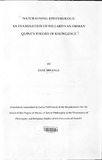| dc.description.abstract | This dissertation is a critical examination of W.V.O. Quine's notion of a naturalised epistemology. Since its formulation, naturalised epistemology has and still attracts criticisms and counter criticisms for and against it. The main objection which seems to have defied several responses, including Quine's, is that naturalised epistemology abandons normativity which is critically essential to epistemology.
Quine's epistemological theory is a radical shift from the traditional foundationalist approach to epistemology. His proposal for naturalisation of epistemology is based on the argument that the classical foundationalist approach to epistemology with its key pursuit of a priori propositions for the establishment of a foundation for knowledge is an untenable venture as exemplified by the predicament that befell David Hume and later on Rudolf Carnap. For epistemology to progress, he asserts, we must avoid the Carnapian fate, where reduction efforts to translate scientific discourse into sensory evidence fails, by adopting the method of science.
This study discusses two main objections against naturalised epistemology as formulated and presented by their main proponents; Jaegwon Kim, the normative charge and Barry Stroud, the sceptical charge. Kim argues that Quine's departure from the classical foundationnalist epistemology with its justification centered component amounts to purging off epistemology its normativity. He asserts that Quine's naturalised epistemology means dispensing with justification which is the normative element of the concept of knowledge. Stroud on his part accuses Quine of inconsistency.
He argues that Quine's claims that there is no appeal to scientific knowledge that can non-circularly validate scientific knowledge in the presence of the traditional epistemological skeptic is quite in contrast with his other claim in 'Roots of Reference' that we should seriously embrace the project of validating our knowledge of the external world. Quine's claim of embracing validation in his project, seem to endorse the basic question of traditional epistemology which is validation. This in itself is a contradiction since Quine's naturalised epistemology is anchored on the impossibility of realizing a first philosophy or a priori knowledge.
The thesis argues that Quine's naturalised epistemology is normative by demonstrating the existence of justification and scepticism, the twin processes that entrench normativity. It emerges that in naturalised epistemology, beliefs are held as reliable only after being subjected to a vigorous scrutiny akin to scientific experimentation to establish their accuracy, reliability, consistency and non-arbitration in as far as their representation of the world is concerned.
Beliefs are always held sceptically just like scientific hypotheses until they are subjected to the process of justification to establish their status as either, reliable and therefore true and/ or knowledge or unreliable and therefore false and/ or devoid of knowledge until proven otherwise. Beliefs that cannot be subjected to the process of validation are beliefs that cannot generate knowledge just like theories that cannot be tested and therefore cannot qualify as scientific theories.
The research concludes that contrary to the objection that Quine's naturalised epistemology is non- normative, it can account for normativity since it does not in any way do away with the normative concepts of scepticism and justification. Furthermore, it recommends that since the objective of epistemology is to establish a criteria for beliefs that qualify as true and therefore knowledge, any theory of epistemology should go beyond focusing on the criteria and assess how the beliefs are formed. | en_US |

